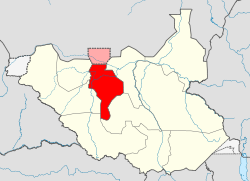S. Sudan communal clash leaves over 30 dead, dozens injured
December 18, 2017 (JUBA) – At least 30 people died in communal clashes that erupted in South Sudan’s Tonj East county on Sunday, an official said.

Efforts are still underway to establish the actual cause of the fighting, which occurred in Marial Lou village, located north east of Tonj town, the administrative headquarters of Tonj state, the deputy governor of Tonj state, Manhiem Bol said.
Bol told Sudan Tribune that has been coordinating efforts to ensure that the security forces are dispatched to the scene of the incident and to ensure that the two communities that clashed are separated.
The deputy governor, who hails from the area, identified the feuding communities as hailing from Jal-wau and Ngaap-agok Counties.
“We are working hard with the traditional leadership, county commissioners and the national government to contain the situation. We are talking to both communities so that they stop fight and listen”, Bol said on Monday.
The official, with no clear information on actual numbers of casualties from the clash, said he expects a rise in numbers of those killed.
“Actually there is no clear information about the number of the people killed. But the information we are getting indicates some lives were lost, 35 people from both sides. This number could rise, it could increase because nobody has been able to reach where the fighting took place. People are just giving us figures of those they know to have been lost during the first. The youth involved in these unfortunate clashes are the ones giving us information”, he added.
With the help of other local officials, Bol said they hope to verify the situation after ensuring the situation has been brought under control and security forces have been dispatched to the scene to take charge.
Tonj is one of the areas in war-torn South Sudan that has been bogged down in constant communal feuds over pastures. Other key drivers for the inter-communal conflicts include competition for scarce resources, border disputes and political differences.
Meanwhile, the county governments in collaboration with the humanitarian partners are reportedly coordinating ongoing humanitarian interventions on the ground and its teams have identified critical needs across all sectors including food, health, shelter and non-food items, education, water, hygiene and sanitation and protection.
The clashes occurred after a joint peace conference, held this year, brought together governors from the Bahr el Ghazal region to discuss how to could come up with ideas and implementable action plans to resolve communal disputes. The conference, among other resolved that forceful disarmament be carried out among the civil population and that special courts to try suspects of violence be established.
Last week, President Salva Kiir declared a three-month state of emergency in Gok, Eastern Lakes and Western lakes states, where inter-communal clashes had intensified.
(ST)
